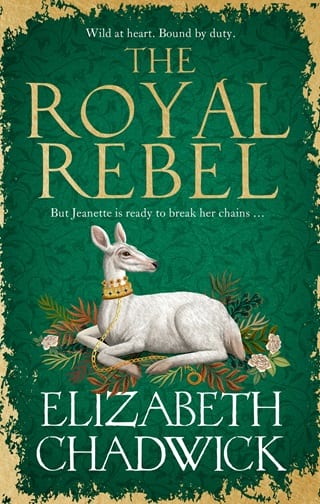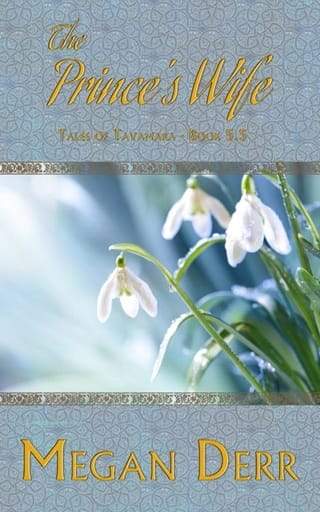4 Antwerp, Flanders, December 1338
4
Antwerp, Flanders, December 1338
The sun cast stripes across the frosty grass, glittering the silver with icy gold and gilding the pavilions of the lords and knights who had gathered to tourney in celebration of the birth, four weeks ago, of the King and Queen's new son, baptised Lionel after one of King Arthur's knightly heroes.
Jeanette had never seen so many depictions of lions in one place before. They decorated banners and shields and barding. People sported lion badges on their clothes and woven into the fabric itself, or embroidered on hems and cuffs and belts. There were hats decorated with lions, and garters and shoes. The wafer sellers and hot pie vendors were hawking lion-shaped confections and pastries, all to celebrate the baby prince.
The King had been absent from court well into the autumn, busy about the matter of gathering allies and raising funds to aid his war with France and seeking support for his claim to the French throne, but had returned to celebrate his son's birth and to spend the Christmas festivities with his family.
Jeanette sat in the stands that had been erected for the eager spectators. Her breath emerged in puffs of white vapour, but bundled up in her fur-lined cloak she was not cold, and extra warmth rose from the hot stones placed beneath the benches occupied by the Queen and her household with a clear view of the lists. A squire sent a basket of sweetmeats down the line and Jeanette selected and nibbled on a delicious morsel of almond marchpane.
She was tingling with anticipation, for although she had attended tourneys before at court, she had been younger – a child. Now of marriageable age, she could take part as an eligible damsel of the court. A basket filled with artificial flowers crafted from fabric and wire sat in her lap, ready to be cast at the heroes as they rode on to the field. Having spent most of the autumn cooped up in the Abbey of St Michael, attending on Queen Philippa while she awaited Lionel's birth, Jeanette's anticipation was as keen as a knife. Of course, she adored the baby. He was so sweet with his huge blue eyes and a coppery glisten to the hair beginning to grow on his little round head. She loved to hold him, sing to him and rock his cradle, but even so, there were many more things in the world to see and do that did not involve babies and sewing.
Occasionally, she had managed to escape when the older ladies were preoccupied with the Queen or too comfortable around the fire with their hot wine to bother about her, but she had had to choose her moments wisely and not abscond for too long, lest she be reined in and forbidden to go out at all.
Her greatest success was spending time in the mews visiting her merlin, Athena, which was at least viewed as being a legitimate occupation. The small, creamy-brown falcon had been a gift from Queen Philippa when Jeanette was six years old, and she had learned the art of falconry and hunting with her. Athena had already been fully grown when she came into Jeanette's keeping, and she was overdue a new bird, but she remained fiercely loyal to the little merlin, and loved her with every fibre of her heart. She whispered her thoughts to her, her secrets and desires. Who she liked, who she didn't. How much was unfair and unworthy and boring.
Now at last with the King's return, the court was a different place, sparkling with danger and possibility. And a tourney was a magical thing – it was like the sugar pinnacle on a subtlety, and Jeanette was ready to devour every moment to the last sweet sliver.
A blare of trumpets heralded the parade of knights on to the field and she craned her neck to watch them ride past in their gorgeous array. The King led them out, clad in the red and snarling gold of England, trimmed with the blue and gold fleur de lys of his claim to the French throne. Heralds and squires, men at arms, accompanied him, their pike-tips flashing in the winter sun. The steam clouds rising from the horses made the array appear otherworldly. Indeed, some of the palfreys were decked out like unicorns with false golden horns twizzling from their brow harnesses.
Jeanette's heart swelled with joy. The knights rode past the stands in their glittering parade armour and the ladies tossed their flowers over them in a bright shower. She cast her eyes avidly over the procession until her gaze lit upon a jet-black stallion barded in blue and gold, a coppery chestnut pacing in tandem. Here were the brothers Thomas and Otto Holland. Half rising, she threw her lapful of flowers, and watched them tumble against the men's armour. One of the blooms caught between the mane of Thomas's horse and the rein guard, and stayed there, the same rich blue as his surcoat.
He looked up, found her with his smile, and her cheeks burned as he saluted her. Lips parted, she followed him with her gaze, until her stare was interrupted by a warning hiss from Lady Katerine, who waved at her to sit down. She obeyed, but had to tap her toes and wriggle, unable to stay still.
The ensuing sport was so exciting that Jeanette spent her time on the edge of her seat, and only the threat of being made to leave the stands for indecorous behaviour kept her from jumping up and down. The knights rode at each other headlong and she gasped at their speed and skill. Even if much of the display was theatrical, with many of the moves worked out beforehand between the men, it was a thrilling spectacle, and a huge element of danger remained as the horses thundered towards each other and the lances cracked and shattered.
Between bouts, the knights and squires displayed their skills at the quintain. There were wrestling matches and demonstrations of weapon-craft in front of the lodges, the blades flickering with the speed of summer lightning.
Her heart in her mouth, her hands clammy, Jeanette watched Thomas Holland gallop down the lists on his powerful black. The staccato snorts of the horse and the drum of hooves on the hard turf vibrated through her own body. He punched his opponent clean out of the saddle with a direct strike, and turned at the end of the tilt to canter back, dismount and assist the fallen man to his feet, making sure he was all right, and slapping his shoulder. The black warhorse stood as meekly as a lamb behind the men, but eventually shoved Thomas in the back with his nose, to laughter and applause from the stands. Thomas bowed to their audience, then tapped the stallion's shoulder to make him bend a foreleg and bow too. Then he leaped into the saddle and rode off to ecstatic cheers.
Jeanette's body rioted with overwhelming emotions she had no experience to name and she could not take her eyes from Thomas and his horse as they left the field.
He rode again several more times, taking two more opponents in clear victory and conceding a draw to Lady Katerine's husband William Montagu, Earl of Salisbury. The latter, in contrast to Thomas's light-hearted fluidity, sat solidly in the saddle, treating the joust as serious warfare rather than play. That Thomas emerged with a draw and unscathed was in itself a kind of victory, applauded in the lodges.
Thomas and his brother also demonstrated their sword skills to the spectators. The display, carefully choreographed, was still a dangerous dance, so fast that the blades were a silver blur. These were the elite young knights in the service of England's king. Highly trained, virile and ambitious, their talent was displayed not only as entertainment for the English court, but to show King Edward's Flemish allies how strong a contender he was for the French throne with men such as these in his entourage. Jeanette watched, enthralled. Thomas was elegant but powerful and as light on his feet as a swallow in flight.
When it came time for the Queen to present the prizes, William Montagu was awarded the accolade of supreme champion of the tourney, receiving a silver gilt aquamanile in the shape of a knight on horseback, and a bright plume of peacock feathers to adorn his helmet. His wife looked on, flushed with pride. Jeanette thought with partisan indignation that it was only because Montagu was an earl and the King's close friend that he had been awarded the prize. Thomas had been as good, if not better.
Nevertheless, the Holland brothers received a pair of engraved silver bowls for their sword skills. As they knelt to receive their reward, Jeanette noticed with a flash of excitement that Thomas had threaded her blue flower through a band on his sleeve. She watched him avidly for a look or a sign, but his attention was focused on the King and Queen, and then he and Otto bowed and moved on to make way for the next prize winner.
Jeanette would have rushed after him, but it was impossible, and anyway, she would not have known what to say. She felt giddy, as though she had been drinking effervescent wine, and once more received a sharp reprimand to sit still and behave, this time from Lady St Maur, her eyes narrow with disapproval.
Leaving the stands a short while later with the Queen's entourage, Jeanette walked across the frozen ground where Thomas had fought with Otto and felt a sudden sharpness under her shoe. Wincing in pain, she looked down and saw a small, shield-shaped belt pendant sticking out of the mud at a slanted angle. The piece was enamelled with the Holland blazon of a golden lion on an azure background. Her heart leaped, for it was a sign!
‘What's that?' Joan asked her as she stooped to pick it up.
‘It's a belt fitting,' Jeanette said. ‘It must have fallen off during the fighting.' She closed her fist over it. ‘I shall keep it for luck, and to remember this day.' And because it belonged to Thomas, but Joan didn't need to know that.
Holding hands with the little princesses, Joan on one side and Isabelle the other, Jeanette stepped with the household maidens in a round dance they had been practising for the pleasure of the King, the Queen and their guests. The knights had performed their part in parade and joust; now it was the turn of the court damsels to provide an entertainment.
Jeanette was a light and skilful dancer. She loved moving her body and adored music. No one called her to task, and her willowy grace commanded approving smiles. She wore her thick golden hair in an ornate braid decorated with a chaplet of evergreen and red berries. A red velvet gown clung to her lithe body. Her shoes were gilded green leather with lozenge-shaped cut-outs. Her white silk hose, fine as gossamer, were a gift from the Queen. The allowance she received from her mother did not run to such extravagance. Every now and again Jeanette flicked her gown to show a momentary peek of her ankle, embraced by the delicate strap of her shoe.
Dancing before the court, relishing the moment, she experienced a sensation of power. Thomas Holland was standing among a group of household knights and she tried to catch his eye. He looked up once, and smiled at her with impersonal courtesy, before tilting his head to listen to what a companion was saying.
The dance ended on a flourish of pipes, and the maidens swept curtseys and returned to their places on a wave of applause. Dishes of sugared fruit and nuts were handed round the tables, and a group of tumblers took their turn before the high table, juggling with balls, painted to look like golden apples. The young princesses were carried off to bed by their nurses, but the older maidens were permitted to stay a little longer. It was not just an indulgence of the season, but an opportunity for the royal family to display the young ladies – rare jewels in their wardship – as potential marriage partners for the right alliance.
Several women, including married ones, had gathered around the knights, eager to enjoy the presence of virile prowess. Jeanette watched Thomas laugh and flirt with the ladies every bit as much as they flirted with him. She fiercely willed him to look her way. At last he did, and, smiling, excused himself from the group and made his way across the room to her.
She inhaled the scent of rosemary and sandalwood from his clothes. His green household robe was different and newer, embellished with velvet. Pinned to his breast in a garland were several cloth-and-wire flowers that the ladies had cast earlier, including her own.
‘Demoiselle,' he said, ‘I hope you enjoyed today's sport?'
‘Indeed, yes,' she replied. ‘You are wearing my flower, the blue one – I made it myself.'
‘Then I shall treasure it.' Gravely amused, he touched the little decoration. ‘Which part of the tourney did you enjoy most?'
‘Why, that you all survived, of course,' she answered pertly.
‘Would you expect otherwise? The King has every faith in us.' His eyes sparkled. ‘Do you think you could hold a seat as well?'
Jeanette put her nose in the air. ‘I am a good enough rider, messire.'
‘I am sure you are – in many circumstances.'
His words sent a delicious frisson down her spine, and an awareness of danger. For him, it was clearly a routine exchange of courtly flirtation, for she sensed his attention wandering and knew he was about to move on.
‘You dropped this on the field.' She showed him the enamelled belt pendant.
He looked at the little shield on the palm of her hand, before folding her fingers over it. ‘Keep it in exchange for a flower,' he said.
Jeanette clutched the pendant, the sensation of his touch tingling on her skin, and knew she was in possession of the greatest treasure in the world. ‘I will always shout for you in the lists, messire.'
‘And I shall be honoured to carry your favour, demoiselle.' He bowed, enjoying the moment. Another dance struck up, and although he had been about to make his farewells, he changed his mind and extended his hand. ‘We should seal the bargain and dance.'
Her eyes opened wide, but she gave him her hand and let him lead her to join the other courtiers. To the music of drum, lute and pipe they moved side by side in a circle, sometimes hand in hand, and sometimes hand on hip. Thomas changed the step at one point, flicking her a conspiratorial glance as he crossed one foot over the other and back, nodding encouragement when she followed him. Then she surprised him into laughter by making a double step of her own that he had to follow. The circles surged forward into a tight knot like the centre of a daisy, and then back out again, becoming petals. As the dance ended on a shout and a clap, they were both alive in the joy of the moment.
Thomas bowed to her. ‘Never have I stepped with a finer partner, demoiselle,' he said. ‘Unless it be my brother Otto in the dance of the sword.'
Jeanette curtseyed, feeling hot. ‘I know, sire, I saw.'
He lightly touched her elbow. ‘I must attend to my duties now, but thank you for your company – I have enjoyed it beyond measure.'
She masked her disappointment by giving him a smile, both shy and mischievous, and made sure she was the first to turn away so that he would see her back and she would not see his. In truth, she could have danced with him for ever.
When she retired to prepare for bed, she threaded the little belt mount on to a blue silk ribbon and fastened it around her neck. The laughter and chatter of the other ladies sailed over her head. All she could think about was the dancing and the feel of Thomas's hand holding hers.
‘Jeanette!'
She surfaced with a jolt to Lady Katerine's bark.
‘Stop daydreaming, girl. The Queen commands you to comb her hair.'
She scrambled into her wits, and tucked the little shield down inside her chemise so that no one would see, before hurrying into the royal chamber where Queen Philippa was sitting on a chair, holding the freshly swaddled Lionel in her arms and lovingly fastening a little embroidered cap over his downy hair.
‘Ah, Jeanette, come, tend my hair.' She kissed the baby's brow. ‘Infants,' she said with a smile. ‘They are so small for so short a time and then barely children for a moment before they are grown. I remember when you came to court with your brothers – such a tiny little girl with chubby legs, and those big eyes. Now look at you – taller than I am and a beautiful young woman.'
Jeanette looked down, feeling embarrassed.
‘I want the best for all the damsels in my household.'
Philippa gestured for Lionel's nurse to take him and settle him in his crib and then pointed to her box of combs and unguents, indicating that Jeanette should begin her task.
Wondering if she was about to receive a lecture, Jeanette rose from her curtsey and came to stand behind the Queen. Philippa's hair was a blue-black mass of vigorous curls and she had to carefully work the comb through the waves, constantly dipping the tines in rose water and smoothing with a cloth to avoid ferocious tangles.
‘The time is coming,' Philippa said, ‘when you will marry, as I am sure you have been told by your mother and others. I hear you have bled every month for a year now.'
Jeanette swallowed. ‘Yes, madam, but I am content in your service.'
‘Of course you are.' The Queen looked round at her and smiled. ‘And for now, I am content that you remain so. You danced beautifully for the court tonight, and your lessons are progressing well – other than your needlework.'
Jeanette chewed her lip, but Philippa's dark eyes were sparkling with humour. ‘It is not given to everyone to possess that skill. You have many others for a husband to commend. You are quick to understand, you never panic, and you are always practical.' She turned to the front again. ‘It is true you are often heedless of consequences and far too headstrong, but you are young enough for that flaw to be adjusted before marriage.'
‘Yes, madam.' So, this was a lecture after all. She had no doubt that Lady Katerine and Lady St Maur had found time to have words about her.
‘Come, my dear, do not be glum,' Philippa said cheerfully. ‘I have not summoned you to scold you, but to say that I recognise your talents and that your faults may be corrected with a little application. I was married when I was little older than you are now, and had the responsibility of a husband and a kingdom written on to the blank pages of my book. What will be written on yours and how you will embellish its worthiness remains to be seen. I want you to succeed, because then I shall have succeeded too, as will every woman in this chamber. You do this for others as well as yourself.'
The words entered Jeanette's being at a deeper level than Lady Katerine's scolding over trifles; she could not dismiss them in the same wise. They were an inspiration rather than fuel for defiance. Embroidery might be a lost cause, but she could work on other areas. She would do it for the Queen, not for her mother or Katerine of Salisbury. ‘I do understand, madam,' she said. ‘I shall try my best.'
‘Good, then we have a pact.' Philippa turned again to give her a conspiratorial smile. ‘You can come to me with anything, and I will listen, I promise.'
Jeanette curtseyed, her throat tight with emotion. She worked on until the Queen's hair lay in a thick plait, textured like brocade. Philippa thanked her and from a nearby basket produced two shining twists of teal-coloured silk ribbon. ‘These arrived from a mercer today, and I think they will enhance the colour of your eyes.'
‘Thank you, madam. They are beautiful and you are very kind.'
Philippa waved her hand. ‘Not at all. Go now to your bed and sleep well, and we shall begin a new day in the morning.'
Jeanette curtseyed again and departed. Kicking off her shoes at her own bedside, she lay down on the coverlet. She now had two strands of thought to occupy her mind, twisting and shimmering like the ribbons. The one concerning Thomas Holland remained uppermost as she touched the pendant lying between her breasts, but as she closed her eyes she vowed that she would make a better effort to play her part in the household – providing they did not expect miracles of her sewing.
 Fullepub
Fullepub 



